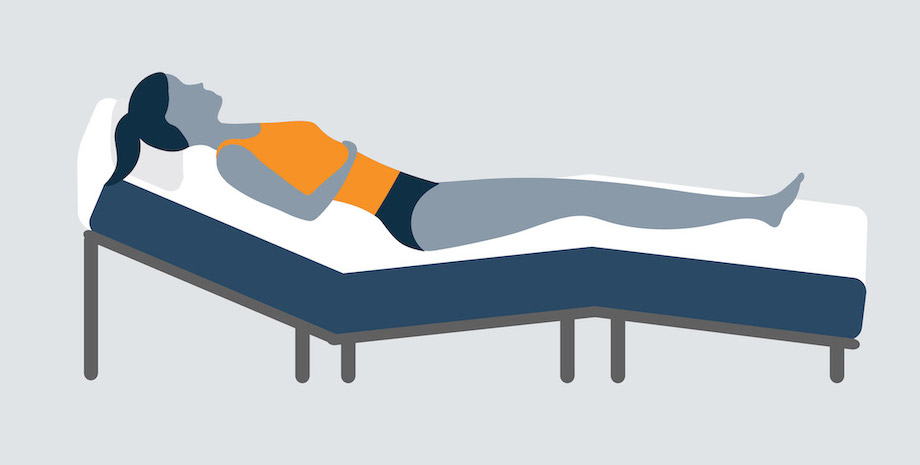If you’ve ever tried falling asleep with a bloated stomach, you know how uncomfortable this can be. However, if this is something you continuously struggle with, it’s time to find a more lasting solution.
There are several reasons why you might have a bloated stomach, from the foods you eat to how you eat them. In some cases, it could be hormones or poor digestion, in which case it’s best to talk to your doctor.
Either way, sleeping in certain positions could help you relieve the tension and discomfort coming hand-in-hand with a bloated stomach. In this article, we’ll discuss all the best sleeping positions for a bloated stomach as well as potential causes and remedies.
Best Sleeping Positions to Relieve Gas
Sleep On Your Left Side
Sleeping on your side can help relieve stomach bloating and gas. More specifically, though, sleeping on the left side4 is considered the ideal position to aid digestion and could help alleviate problems like indigestion, heartburn, and acid reflux.
If you’re new to side sleeping, a body pillow could help you feel more comfortable. In fact, body pillows are often a go-to pregnancy pillow . We suggest you try sleeping with a pillow between your knees to keep the hips and lower spine aligned for more comfort.
Related: Best Mattresses for Side Sleepers
Back Sleeping On an Incline
If you prefer to sleep on your back, another tip is to sleep on an incline. Health experts say that keeping the head and torso slightly elevated 6 to 9 inches5 high could help alleviate stomach issues associated with GERD. There are several ways to sleep in this posture, including the use of a wedge pillow or an adjustable bed frame.

To help you feel even more comfortable while back sleeping, we suggest you try lying with a pillow under your knees to help take the pressure off of your lower back.
Lear more about the best sleeping positions overall.
Sleeping Positions to Avoid When Bloated
Stomach Sleeping
If you’re bloated, try to avoid sleeping on your stomach. Lying in the prone position can put additional pressure on your already bloated stomach.
Plus, stomach sleeping is not ideal for a healthy spine alignment because it can create more stress on your lower back, and your neck is forced to turn to the side all night long.
Learn more: Why Stomach Sleeping is Bad

What Causes Stomach Bloating?
Stomach bloating can happen due to many things, including hormones, digestion problems, and the foods you eat.
Diet
Some foods are more difficult to process than others, which can cause bloating in people. Foods that can cause stomach bloating1 include:
- Beans
- Lentils
- Dairy products
- Carbonated drinks
- Insoluble fibers like wheat, rye, and barley
- Certain vegetables like Brussels sprouts, broccoli, and cauliflower
- Apples and pears
- Onions and garlic
- Artificial sweeteners
- Foods high in fat
- Beer
However, it’s important to note that not each of these foods will make everyone bloated. In other words, what might cause your stomach to bloat may be completely safe for someone else to eat.
You should also pay attention to how you eat. If you eat too quickly, you may have a bloated stomach because you can’t chew your food properly this way. Similarly, your stomach can also bloat if you eat too much.
More Information: Nutrition & Sleep and Obesity & Sleep
Digestive Issues or Food Intolerances
People with digestive problems might struggle to process certain foods, such as those rich in fiber or made from dairy. Therefore, anyone with a particular digestive disorder should be careful about the food they eat.
Examples of digestive disorders2 that could cause bloating (among other symptoms) include gastroesophageal reflux disease (GERD), cancer, irritable bowel syndrome (IBS), lactose intolerance, and a hiatal hernia.
If you haven’t been diagnosed with a digestive issue but suspect you have one, we suggest you talk to your doctor.
Hormones
It’s common for women to feel bloated due to hormonal fluctuations3 from rising estrogen levels causing water retention. Hormones affect our digestive system as much as everything else, so it’s no surprise they can cause bloating. This is normal for women due to the menstrual cycle, but remember that men can experience hormonal fluctuations, too.
Learn more about how pregnancy impacts sleep and how puberty impacts sleep here.
Constipation
If you’ve ever felt constipated, you might also experience bloating. This is because the stool stays in the colon for too long, producing bacteria that ferment and produce gas. Constipation can be either occasional or chronic.3
Bowel Obstructions
If you experience bloating too often, it might be due to a partial or complete bowel obstruction in the small or large intestine. In many cases, you might also experience abdominal pain, so we suggest you see your doctor as soon as possible. Not only can bowel obstruction make it difficult to have bowel movements, but it can also cause more severe complications.3
Mobility Disorder
Certain mobility disorders like intestinal pseudo-obstruction, gastroparesis, and pelvic floor dysfunction could lead to bloating. This can happen either due to constipation from these conditions or because these disorders cause your digestive system to operate more slowly.3
Weight Gain
If you’ve recently gained 10 pounds or more, this may also cause you to feel more bloated than usual. Experts say the reason for this is that the weight gain causes more volume in the stomach, leading to less room for your digestive system to work, which could lead to bloating. They add that the weight gain may also correlate with water retention, another culprit behind stomach bloating.3
How to Relieve Bloating and Gas
Along with sleeping in a better position for overall digestion, there are other remedies for gas and bloating you can utilize to help you feel better.
Ginger
Ginger is considered a remedy for both bloating and gas6. Furthermore, research has found that ginger can aid gastrointestinal function7, along with other issues like nausea and vomiting, pain, inflammation, and metabolic syndromes.
There are several ways to consume ginger, including via tea, root, and powder. However, experts advise steering clear of ginger supplements as you won’t likely receive the same health benefits from them.6
Magnesium Oxide
Magnesium oxide is sometimes used as a laxative for short-term constipation8. If you feel bloated due to occasional constipation, this could be a potential solution. Magnesium oxide is available as a tablet or capsule, but we strongly advise consulting with your healthcare provider before taking any.
Peppermint Oil
Peppermint oil can help with bloating, cramps, and flatulence by helping the bowel muscles relax9. Peppermint oil is available in capsule form, though again, we recommend talking with your doctor before taking any new medications or supplements.
Take Probiotics
Probiotics help support your overall gut health, either by fostering better digestion or alleviating gas, both of which could help with uncomfortable bloating. However, probiotics aren’t typically an overnight solution; experts advise you may need to take them for a few days to several weeks to notice an improvement.3
Rule Out Food Allergies, Intolerances, or Other Causes
Food allergies and intolerances can also cause bloating, and so can other underlying conditions. These can trigger bloating or make it worse regardless of what initially caused it.
If you experience bloating more often than not, we suggest you talk to your doctor to figure out what exactly is causing it.
Exercise
One of the best ways to relieve a bloated stomach is through regular exercise, including strengthening your core muscles.3 Another benefit of daily exercise is that it is linked to overall better sleep quality10.
Tumeric
Tumeric has been found to relieve gas and bloating11 in people experiencing indigestion. However, health experts advise incorporating this spice naturally into your meals12 rather than taking it via supplements as this could increase your risk of developing kidney stones.
Frequently Asked Questions
Does eating before bed cause bloating and gas?
Some people might experience gas and bloating because the body hasn’t had a chance to properly digest the food. Also, research suggests that those who experience GERD should avoid eating within three hours of their bedtime13 as this could worsen their symptoms.
Can a lack of sleep impact gut health?
Yes, poor sleep can cause digestive health issues. This is because sleep can impact how well your digestive system works14. Simultaneously, though, stomach discomfort can lead to poor sleep, which can ultimately create a problematic cycle
What foods are safe to eat before bed to avoid bloating?
Although eating too close to bedtime is generally not recommended, going to bed too hungry can also be distracting. Also, certain foods could facilitate better sleep because they contain melatonin and magnesium.
Some of the best foods for sleep include kiwi, tart cherry juice, walnuts, almonds, and yogurt. These are also light enough snacks that shouldn’t leave you too full before bed.
Is it okay to eat sugar before bed?
We suggest you avoid eating too much of it right before going to bed. According to research, increased sugar intake is linked to poor sleep quality15. Plus, eating sugar before bed could give you an unwanted energy spike that could make it harder to fall asleep.

Olivera Jancikin
Content Writer
About Author
Olivera is a content writer for Sleep Advisor and is enthusiastic about sleep. She firmly believes in the benefits of daytime naps on top of getting a full 8-hour sleep at night.
Combination Sleeper
- 1. “15 Foods That Can Cause Bloating”. Cleveland Clinic. 2022. –
- 2. “Digestive Disorders”. Johns Hopkins Medicine. Webpage accessed January 2, 2024. –
- 3. “Bloated Stomach”. Cleveland Clinic. Last modified September 10, 2021. –
- 4. Howard, Beth. “What’s the Best Sleeping Position for Your Health?”. AARP. 2022. –
- 5. “Gastroesophageal reflux disease (GERD): Diagnosis & treatment”. Mayo Clinic. Last modified January 4, 2024. –
- 6. “Ginger Benefits”. Johns Hopkins Medicine. Webpage accessed January 2, 2024. –
- 7. Hoang Anh, Nguyen., et al. “Ginger on Human Health: A Comprehensive Systematic Review of 109 Randomized Controlled Trials”. Nutrients. 2020. –
- 8. “Magnesium Oxide”. Medline Plus. Last modified October 15, 2015. –
- 9. “Peppermint oil”. National Health Service. Last modified July 12, 2021. –
- 10. Alnawwar, Majd A., et al. “The Effect of Physical Activity on Sleep Quality and Sleep Disorder: A Systematic Review”. Cureus. 2024. –
- 11. “Turmeric”. Mount Sinai. Webpage accessed January 2, 2024. –
- 12. “Turmeric Benefits”. Johns Hopkins Medicine. Webpage accessed January 2, 2024. –
- 13. Fujiwara, Yasuhiro., et al. “Association between dinner-to-bed time and gastro-esophageal reflux disease”. National Library of Medicine. 2005. –
- 14. “How Lack Of Sleep Can Affect Gut Health”. Henry Ford Health. 2021. –
- 15. Alahmary, Sarah A., et al. “Relationship Between Added Sugar Intake and Sleep Quality Among University Students: A Cross-sectional Study”. American Journal of Lifestyle Medicine. 2022. –
